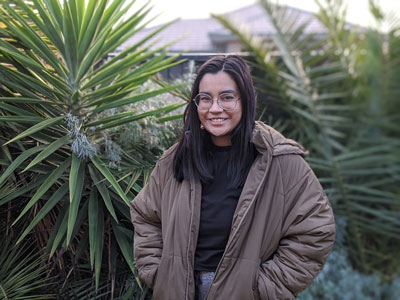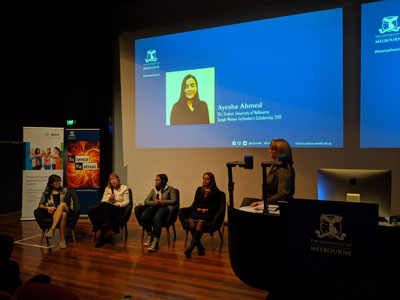Student-led initiatives bridge divide in technology participation
 It is time, in the interests of science, for girls to step up and step out, says software engineering student and technologist Ayesha Ahmed.
It is time, in the interests of science, for girls to step up and step out, says software engineering student and technologist Ayesha Ahmed.
The Bachelor of Science student at the University of Melbourne has helped to coordinate new initiatives aimed at increasing young women’s participation in computing and information systems. It is a group, she says, that is still too underrepresented in the field.
Over the past three years, as a student and organiser of science and engineering challenges, she has encountered a lack of confidence among women when it comes to pursuing maths-based courses. She has set out to change this by finding ways to make technology, especially computer sciences, more engaging for secondary and tertiary students.
Ayesha has been collaborating with her student peers on initiatives to encourage greater understanding of computer sciences, as a way to broaden participation.
The first is a plan to educate high school students about technology. The aim of this proposed program it to demystify any misunderstandings that students have about working or studying in technology.
“I think we need to better communicate technology and its role. Technology is not just code, or robotics or math; it’s how you create products and how people interact with those products and how you make sure the technology has social accountability.”
Ayesha believes that broadening this understanding may also broaden participation in science and technology.

Ayesha was a part of the Women in Science network event Changing Science: Celebrating women making a difference in STEMM careers at Science Festival 2019.
The second initiative, already underway, is the Google Hash Code competition, a global challenge involving teams of students presented with an engineering problem.
“What’s good about this competition is it is ‘beginner friendly’,” says Ayesha. With fellow science students Betty Lin and Nicole Widjaja, Ayesha helped to establish the first ever Australian hub of the competition in 2019, which saw teams participating from the University of Melbourne. She is keen to encourage students from other tertiary institutions to initiate hubs as well.
“The goal isn’t to win, but to build a community of people with a shared interest in engineering and computer sciences by being able to say, ‘hey, this is an engineering competition and you can join because it’s for all skill levels’.”
The gender divide in Australian participation in computer sciences, which is her field of study, particularly motivates Ayesha.
She has already been recognised internationally for her efforts to broaden participation. She is a 2020 recipient of the prized Global Impact Scholarship from Denver-based software company, Palantir.
Her scholarship recognises her role in initiating a robotics curriculum for secondary schools in United Arab Emirates while she was still a student. While funding her studies at the University of Melbourne, it also allows her to spend time on efforts to expand school curricula participation in science in Australia.
She says her objective in the UAE was to give STEM a practical expression: “When you look at STEM education, it is still framed by basic biology, chemistry and physics. This is fine, but to understand how technology works in society, you also need to understand how technology advances … including its social and economic drivers.
“The robotics curriculum in the UAE allows students to see the technical parts of technology development and how to use this in an impactful way. This is what I hope to bring to Australian schools, not robotics specifically, but different ways to encourage interest and participation in solving engineering problems.”
Ayesha was also recently recognised as one of the 40 under 40 most influential Asian-Australians by the Asian-Australian Leadership Summit during their October 2020 virtual award ceremony. Ayesha was nominated within the Education category, which celebrates the achievements of next generation Asian-Australians and provides a pathway to further leadership recognition.
Ayesha credits her parents with her passion. “I grew up listening to them talking about maths and astrophysics, so I felt it was a basic human interest. I remember people asking what my favourite subject was and I would say ‘art’ to sound different because I thought maths was something that everyone was inherently interested in.”
It was a different at home though. The day her father asked what she wanted to be, Ayesha had no hesitation in saying ‘an inventor’. By the age of 14 she was writing computer code, already clear on the role of science and technology in human advancement and determined to play an active role.
Find out more:
- Asian-Australian Leadership Summit 40 Under 40 Most Influential Asian-Australians Awards celebrate and recognise the achievements of young Asian-Australians.
- Find more information about Palantir student opportunities.
- Find further information about the Palantir Global Impact Scholarship, which Ayesha received.
More from the University of Melbourne: